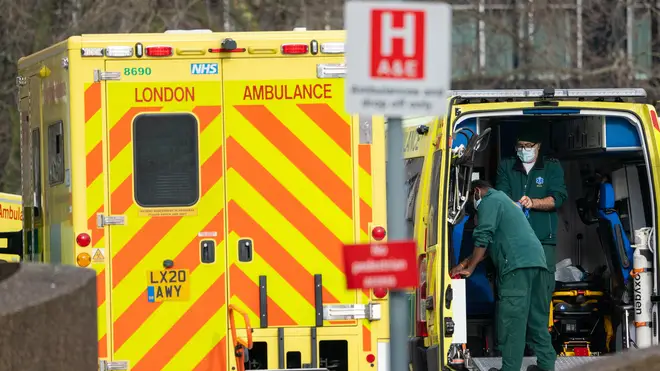
Richard Spurr 1am - 4am
22 January 2021, 16:30

The UK recorded a further 1,401 coronavirus deaths and another 40,261 new cases on Friday.
This brings the total number of UK fatalities to 95,981 and the total number of cases to 3,583,907.
Separate figures published by the UK’s statistics agencies show that more than 111,000 deaths involving coronavirus have now occurred in the UK.
It comes as government data up to January 21 shows of the 5,849,899 jabs given in the UK so far, 5,383,103 were first doses - a rise of 409,855 on the previous day's figures.
Read more: £500 Covid payment for those who self-isolate is 'speculation', minister tells LBC
Read more: Sadiq Khan calls for airport quarantine hotels for people arriving in UK
Some 466,796 were second doses, an increase of 2,760 on figures released the previous day.
The seven-day rolling average of first doses given in the UK is now 306,880.
Based on the latest figures, an average of 400,704 first doses of vaccine would be needed each day in order to meet the Government's target of 15 million first doses by February 15.

James O'Brien caller explains why UK has worst death rate in world
In addition, NHS England data shows a total of 558,553 jabs have been given to people in London between December 8 and January 21, including 504,082 first doses and 54,471 second doses.
This compares to 886,072 first doses and 66,841 second doses given to people in the Midlands, a total of 952,913.
The breakdown for the other regions is as follows:
North East and Yorkshire - 770,405 first doses and 71,599 second doses, making 842,004 in total
North West - 651,591 first doses and 63,149 second doses, making 714,740 in total
South East - 749,116 first doses and 76,088 second doses, making 825,204 in total
South West - 522,308 first doses and 53,256 second doses, making 575,564 in total
East of England - 549,497 first doses and 53,487 second doses, making 602,984 in total.

Sadiq Khan explains why he thinks masks should be compulsory
The latest figures come as it was revealed that the R value of coronavirus transmission across the UK is now between 0.8 and 1 - last week, it was between 1.2 and 1.3.
R represents the average number of people each Covid-positive person goes on to infect.
When the figure is above 1, it means the outbreak is growing exponentially.
An R number between 0.8 and 1 means that, on average, every 10 people infected will infect between 8 and 10 other people.
All regions of England have seen decreases in the R number and growth rate estimates compared to last week, and R is below or around 1 in every region.
There is variation across the country, and the R is estimated to be below 1 in areas that have been under tighter restrictions for longest including Tier 4 over the festive period - namely the East of England, London, and the South East.
There was also a slight drop in the number of people infected with coronavirus in England after lockdown measures were brought in.
Across England, around one in 55 people in private households had the disease between January 10 to 16, according to the Office for National Statistics.
This is the equivalent of 1.02 million people or 1.88% of the population, and is down from one in 50 between December 27 to January 2.